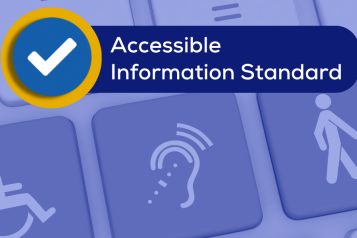Your care, your way - Join Healthwatch's new campaign

Medical and healthcare information can be complex. But, if you're disabled or have a sensory loss, you have a legal right to health and social care information in a way you understand, and communications support if you need it. So, for example, if you're D/deaf, you should be able to use a British Sign Language (BSL) interpreter at an appointment.
Even though the Accessible Information Standard has been a legal requirement since 2016, many NHS Trusts are not supporting equal access to care for deaf and blind patients.
That's why we've launched a new campaign, 'Your care, your way' to ensure services are taking their duty seriously to provide information in a way that people understand.
The obstacles people face trying to access information they understand
The lack of support from services has a detrimental impact on people who need it most. The views of 6,200 people shared with Healthwatch show the incredible difficulties and obstacles people face trying to access the care they vitally need - leaving them frustrated, concerned about their health, and reliant on others.
Just a handful of examples people shared include:
- Dental practices not getting hearing induction loops installed
- GPs refusing people access to a sign language interpreter
- Low staff awareness, with D/deaf people reporting that staff communicated by shouting
- During the pandemic, the lack of accessible information prevented people from understanding national COVID-19 guidance
- Physical barries, such as the introduction of masks, made it harder for people to understand healthcare staff.
Things need to change
Everyone should be told about healthcare in the way they need it. 'Your care, your wa' aims to:
- Find out how well health and care services deliver the accessible information standard.
- You know your rights, if the standard covers you.
- Find out who else has problems understanding information about their healthcare and needs to be covered by the standard.
I feel forgotten, ignored and not taken seriously.
Student, Connor Scott-Gardner, who is blind and requires healthcare information in an electronic format as well as in Braille, said:
"Trying to get information about my own healthcare, in a format I can understand, has often been difficult. I can't read letters that come through the post, or prescription medications. I feel forgotten, ignored, and not taken seriously. All I'm asking for is consistency, training on accessible information for staff - a few minor changes would make the world of difference to people like myself.
What rights do you have?
If you have a disability, impairment or sensory loss, or are a parent or carer of someone who does, you should expect:
- To contact and be contacted by services in ways you find accessible
- Services to give information and correspondence in formats you can read and understand
- To be supported at appointments if needed
- Health and care services to support you to communicate


